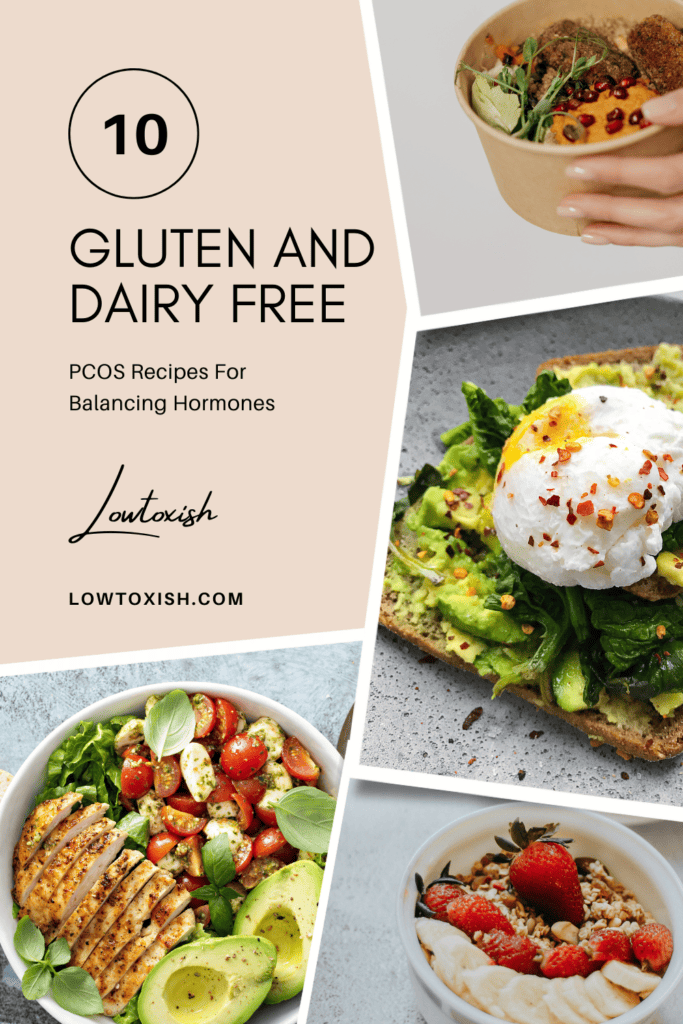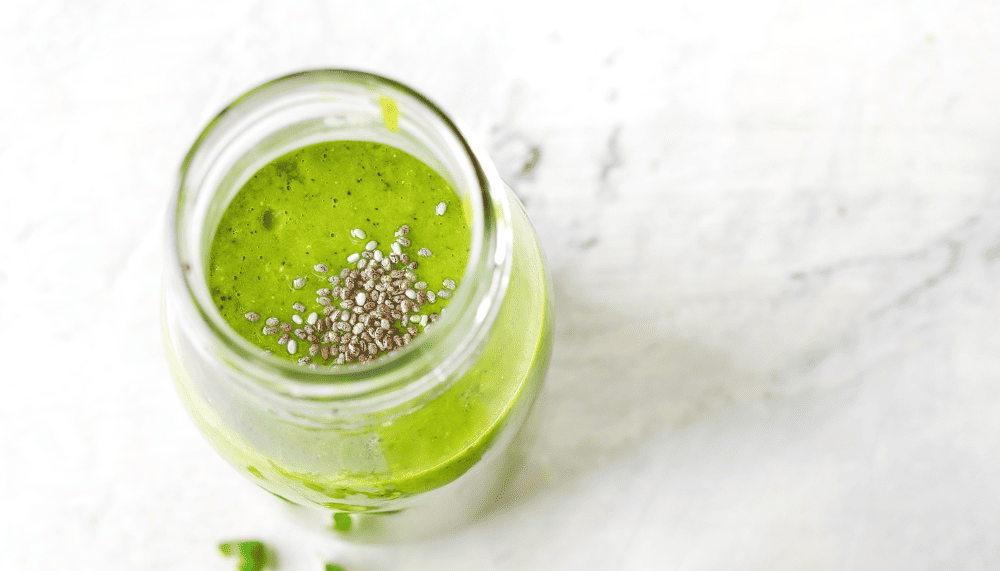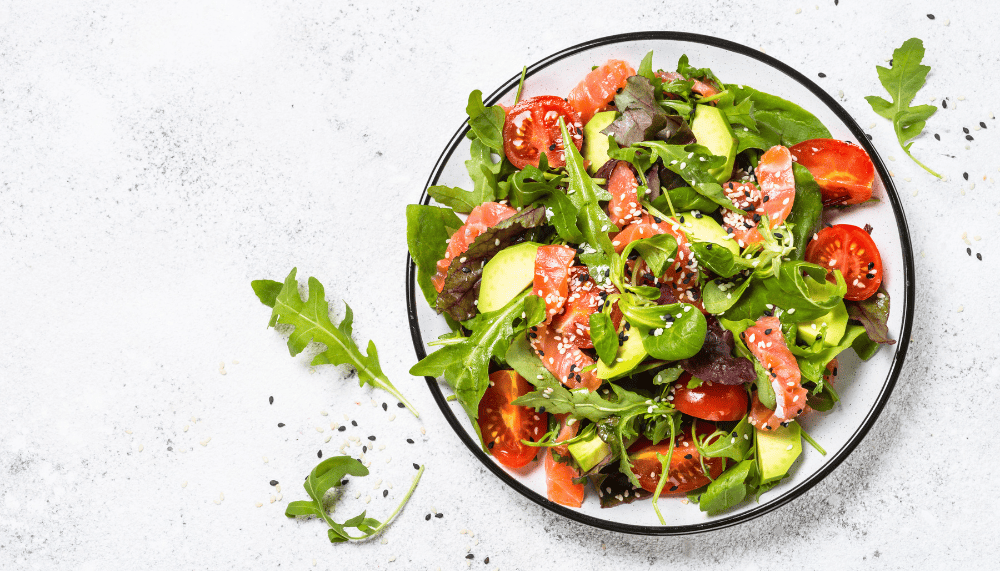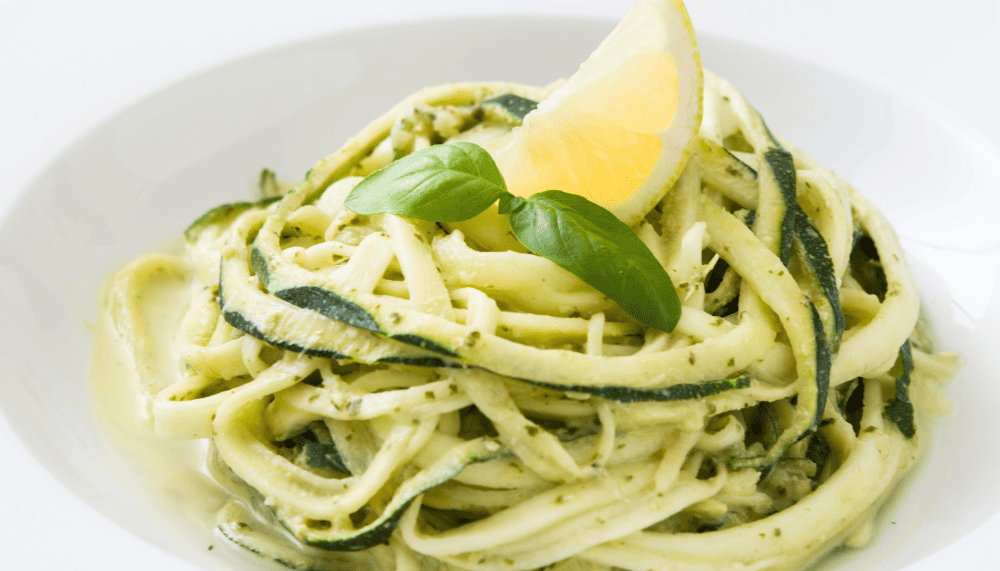Gluten and Dairy Free PCOS Recipes For Balancing Hormones
This post is about gluten and dairy free pcos.

Are you navigating the challenges of PCOS (Polycystic Ovary Syndrome) while also following a gluten and dairy-free diet? You’re not alone. Many individuals with PCOS find relief from symptoms like hormonal imbalance and inflammation by eliminating gluten and dairy consumption from their diets.
In this guide, we’ll explore a collection of delicious and nutritious recipes specifically designed to support hormone balance and overall wellness for those with PCOS. From hearty breakfast options to satisfying dinners, these gluten and dairy-free recipes will make you forget you’re choosing to eat in a slightly more restrictive way. If you’re hungry, use the Table of Contents below to skip to the recipes!
Understanding PCOS and Dietary Restrictions
Before we delve into the recipes, let’s take a moment to understand PCOS and why a gluten and dairy-free diet may be beneficial for managing its symptoms. PCOS is a hormonal disorder characterized by imbalanced levels of insulin, androgens (male hormones), estrogen, and often, insulin resistance.
Gluten and dairy products can exacerbate inflammation and hormonal imbalances in individuals with PCOS, leading to symptoms such as irregular menstrual cycles, weight gain, acne, hair growth, and can contribute to the worsening of insulin resistance. I know firsthand how gluten intolerance and dairy intolerance or lactose intolerance can mess with your body and health.
While exploring the connection between PCOS and dietary choices, it’s important to note that individuals with celiac disease, who must follow a strict gluten-free diet, may also see improvements in PCOS symptoms when eliminating gluten. Although PCOS isn’t considered one of the autoimmune diseases it very much reminds me of one (after dealing with my own autoimmune disease as well as my son’s I am very familiar with the symptoms and side effects of an inflammatory response).
I know it seems extreme to cut out entire food groups but as someone who has been avoiding gluten for over 20 years and dairy and soy for 5-10 years, I can promise you that this dietary intervention can help you with everything from chronic inflammation, autoimmune disorder symptoms, digestive symptoms, leaky gut, brain fog, abdominal pain and fatigue. I was legit MISERABLE after eating until I finally tried an elimination diet and changed my food choices to avoid gluten and dairy (and soy for me).
The Role of Gluten and Dairy in PCOS Symptoms: Gluten and Dairy Free PCOS
Gluten, found in wheat and other grains, and dairy products contain compounds that can trigger inflammation and disrupt hormone levels in individuals with PCOS. By eliminating these potential triggers from your diet, you may experience improvements in hormone balance, reduced inflammation, and relief from PCOS symptoms.
Exploring the Effect of Dairy on PCOS
In our journey to understand the dietary management of PCOS, it’s crucial to delve into the specific effects of dairy consumption. Dairy products, especially full-fat dairy, can have unique impacts on individuals with this condition.
The Nuances of Dairy in a PCOS Diet
The relationship between dairy intake and PCOS symptoms is complex and varies among individuals. While some may benefit from a low-dairy or dairy-free diet, others might not experience significant changes. Understanding the effects of dairy, particularly full-fat dairy products, is essential in tailoring a diet that best suits one’s needs.
Full-Fat Dairy Products and Their Impact
Recent discussions in nutritional science have brought attention to full-fat dairy products and their potential role in PCOS. Some studies suggest that full-fat dairy may influence hormone levels differently than their low-fat counterparts. For instance, full-fat dairy has been associated with increased levels of certain hormones that could potentially impact the symptoms of PCOS.
Milk Products and Hormonal Balance
Milk products, a significant source of dairy, contain various hormones and bioactive molecules that can affect the body’s hormonal balance. In the context of PCOS, where hormonal imbalance is a key concern, the consumption of milk products may have implications that warrant further exploration and consideration. If you are going to keep milk in your diet, make sure it’s organic and the cows aren’t pumped with hormones or antibiotics.
Considering a Low-Dairy Diet for PCOS
For some individuals with PCOS, adopting a low-dairy diet can be beneficial. This approach may help in managing symptoms more effectively, especially for those who are sensitive to the effects of dairy. It’s important to assess how your body responds to dairy and adjust your intake accordingly.
The Ongoing Debate
The debate on the role of full-fat versus low-fat dairy in PCOS management is ongoing. While some evidence points to the benefits of reducing dairy intake, more comprehensive research is needed to draw definitive conclusions. Individuals with PCOS should monitor their response to dairy products and consult with healthcare professionals to make informed dietary choices.
The Impact of Gluten on PCOS Management:Gluten and Dairy Free PCOS
Gluten’s Link to Gut Health and PCOS
Poor gut health is increasingly recognized as a factor that can exacerbate PCOS symptoms. Gluten can be a key contributor to gut health issues, particularly in individuals with non-celiac gluten sensitivity or coeliac disease. These conditions can lead to inflammation and imbalances in the gut microbiome, which in turn, may worsen PCOS symptoms.
Non-Celiac Gluten Sensitivity and PCOS
For those with non-celiac gluten sensitivity, consuming gluten can trigger an array of symptoms similar to those of coeliac disease, but without the intestinal damage associated with the latter. This sensitivity can lead to systemic inflammation, which is particularly problematic in PCOS, where managing inflammation is crucial for symptom relief.
Gluten, Coeliac Disease, and PCOS
Individuals with coeliac disease must strictly avoid gluten to prevent serious health complications. For those with both coeliac disease and PCOS, adhering to a gluten-free diet is not just a choice but a necessity. Eliminating gluten can lead to significant improvements in both gut health and the management of PCOS symptoms.
Gluten and Its Nutritional Considerations in PCOS
When adopting a gluten-free diet, it’s important to consider the nutritional changes it entails. For instance, many gluten-containing foods like white bread are fortified with important nutrients like folic acid. High amounts of folic acid are essential for overall health, especially in women of childbearing age. Those on a gluten-free diet should ensure they are getting these nutrients from other sources.
Having said that… I personally think added folic acid is trash and we need to try to consume folate from dark leafy greens or supplements but you get the idea… there are some vitamins in wheat products that aren’t going to be in gluten-free breads.
The Best Diet for PCOS: Is Gluten-Free the Answer?
Determining the best diet for PCOS involves considering individual responses to gluten. While a gluten-free diet can be beneficial for some, particularly those with coeliac disease or non-celiac gluten sensitivity, it may not be necessary for everyone with PCOS.
Each individual’s response to gluten can vary, and what works for one person may not work for another. From personal experience with cutting gluten out, I think you need to give it a good 3-6 months at least to know if it’s going to help.
Gluten in Common Foods and PCOS
Common gluten-containing foods, such as white bread, can also have a high glycemic index, leading to spikes in blood sugar and potentially worsening insulin resistance – a common issue in PCOS. Replacing these with lower glycemic index, gluten-free alternatives may help in better managing blood sugar levels and reducing the risk of exacerbating PCOS symptoms.
Understanding the Role of Insulin in PCOS: Gluten and Dairy Free PCOS
As we delve into the benefits of a gluten and dairy-free diet for managing PCOS, it’s essential to highlight the role of insulin, a hormone pivotal in regulating blood sugar levels. In many individuals with PCOS, challenges arise related to insulin levels and insulin sensitivity, impacting their overall health.
The Impact of Insulin Levels on PCOS
PCOS is often associated with elevated insulin levels, a condition known as hyperinsulinemia. This excess insulin can increase the production of androgens (male hormones), leading to common PCOS symptoms such as irregular menstrual cycles, acne, and hair growth. High insulin levels can also contribute to weight gain and complicate weight loss efforts, concerns that are prevalent among those with PCOS.
Insulin Sensitivity and Its Importance
Enhancing insulin sensitivity is a key strategy in managing PCOS. Insulin sensitivity refers to how effectively the body uses insulin to manage blood sugar levels. Improved insulin sensitivity means the body requires less insulin to lower blood sugar, thereby reducing the risk of insulin-related health issues.
Diet’s Role in Regulating Insulin
Diet plays a significant role in influencing insulin sensitivity. A diet free from gluten and dairy can help in this regard, especially by eliminating foods that might lead to inflammation and spikes in blood sugar levels.
Additionally, being mindful of the intake of starchy vegetables, which can impact blood sugar levels, is crucial. Balancing these with low glycemic index foods and those rich in fiber can help maintain stable insulin levels and improve overall insulin sensitivity.
I think the HUGE thing to take away from this point is that when you switch to a gluten and dairy free diet you need to not just substitute with gluten free breads, dairy free cheeses and that sort of thing. Instead, try to make whole food substitutions like eat more potatoes instead of breads and try avocado instead of cheese. This strategy will majorly help with regulating your insulin.
Making Smart Dietary Choices: How to Make Cutting Gluten and Dairy REALLY Count.
Opting for foods that support healthy blood sugar levels and improve insulin sensitivity is particularly beneficial for those with PCOS. The recipes in this guide are crafted to aid in this, offering meals that are not only gluten and dairy-free but also considerate of the impact on blood sugar levels and insulin response.
From selecting non-starchy vegetables to incorporating whole, unprocessed foods, these recipes are designed to support your journey in managing PCOS.
Understanding the effects of gluten on PCOS is a critical aspect of determining the best diet for individuals grappling with this condition. Gluten, a protein found in wheat, barley, and rye, can play a significant role in influencing the symptoms and management of PCOS.
In my humble opinion, here’s how to REALLY get the results you want out of cutting out gluten and dairy to help with PCOS:
- Eat whole foods instead of processed alternatives to dairy and gluten.
- Eat more protein: this will make you more full and balance your insulin levels better.
- Always eat protein with your carbs.
- Change your mindset… instead of longing for cheese, bread, ice cream, and pizza, delve into other types of foods like soups, salads, Asian foods (usually dairy and gluten-free), Mediterranean foods, and even Mexican food… these food genres are my go-to because they don’t normally contain dairy or gluten (except I guess Mexican can contain dairy often but I just substitute with guac).
To further comprehend the impact of a gluten and dairy-free diet on PCOS, it’s insightful to look at the findings from recent studies and literature reviews. Scientific evidence plays a crucial role in understanding the best dietary practices for managing PCOS.
Examining the Research: Gluten, Dairy, and PCOS
Literature Review on Diet and PCOS
A comprehensive literature review of recent studies focusing on diet and PCOS reveals significant insights. These studies often explore how different foods and dietary patterns affect the symptoms and underlying mechanisms of PCOS.
Recent Studies and Scientific Evidence
Recent studies have shed light on the role of diet in managing PCOS. For instance, some research indicates that a gluten and dairy-free diet may contribute to better management of insulin levels and improved insulin sensitivity, which are critical factors in PCOS.
Moreover, scientific evidence suggests that such dietary choices might also help in reducing higher markers of inflammation, commonly found in individuals with PCOS. Inflammation is a key factor in the severity and progression of the condition, and managing it through diet can have substantial benefits.
Higher Markers of Inflammation in PCOS
Studies have consistently found higher markers of inflammation in individuals with PCOS compared to those without the condition. This inflammation can exacerbate various symptoms of PCOS, including hormonal imbalances and menstrual irregularities. Research indicates that dietary interventions, can potentially reduce this inflammation, thereby alleviating some of the symptoms associated with PCOS.
The Ongoing Research
While there is growing interest and research in this area, it’s important to note that the scientific community continues to explore the complexities of PCOS and diet. Ongoing studies are crucial to deepen our understanding and provide clearer guidelines for dietary management in PCOS.
Now, let’s explore some delicious and satisfying gluten and dairy-free recipes designed to support hormone balance and overall wellness for individuals with PCOS.
Gluten Free and Dairy Free Breakfast Ideas for PCOS:
Here’s a list of gluten free and dairy free breakfast ideas that I believe will most help your PCOS. Again, just trading a gluten filled frozen waffle for a gluten free frozen waffle is going to do very little for your PCOS symptoms.
- Eggs and breakfast potatoes
- Chia pudding with fruit: add coconut milk to chia seeds and maple syrup or other sweetener and let it sit overnight. Top with fruit.
- Oatmeal. Toppings could include peanut or almond butter, fruit, chia, cocoa powder, nuts, and coconut.
- Egg and bacon or sausage sandwich using gluten free bread.
- Any type of egg scramble, poached eggs, omelet.
- Gluten-free toast or bagel with smoked salmon and a poached egg.
- Gluten-free muffin recipe with vegan protein.
- Quinoa breakfast bowl
- Breakfast casserole with hashed browns, bacon or sausage, and egg. Add dairy-free cheese if you want.
- Smoothie. Add collagen or vegan protein powder for added protein.
1. Quinoa Breakfast Bowl

Ingredients:
- Cooked quinoa
- Mixed berries (such as strawberries, blueberries, and raspberries)
- Chopped nuts (such as almonds or walnuts)
- Coconut yogurt or almond milk
- A touch of vanilla extract
- A drizzle of honey (optional
2. Dairy-Free Green Smoothie

Ingredients:
- Spinach or kale
- Frozen mixed berries
- Banana
- Plant-based protein powder
- Coconut water or almond milk
- Optional: Chia seeds or flaxseeds for added fiber and omega-3 fatty acids
3. Sweet Potato Hash
Ingredients:
- Diced sweet potatoes
- Chopped bell peppers
- Diced onions
- Garlic powder
- Paprika
- Olive oil or coconut oil
Gluten Free and Dairy Free Lunch Ideas for PCOS:
- Salads
- Soup
- Sandwich on gluten-free bread (my favorite is Canyon Bakehouse).
- Chicken Salad
- Lettuce wrap sandwiches or burgers
- Good sides are: fruit, chips and salsa, potato chips, and side salads.
4. Salmon and Avocado Salad

Ingredients:
- Fresh salmon fillets
- Ripe avocados
- Mixed salad greens (such as spinach, arugula, and kale)
- Cherry tomatoes
- Cucumber
- Red onion
- Lemon juice
- Extra virgin olive oil
- Salt and pepper
Savor the flavors of the sea with a nutritious and satisfying salmon and avocado salad. Packed with omega-3 fatty acids, protein, and essential nutrients, this vibrant salad is perfect for supporting your gluten and dairy-free PCOS-friendly diet.
Start by preparing your salmon fillets. Season them with salt and pepper, then cook them in a skillet or bake them in the oven until they are cooked through and flaky. Allow the salmon to cool slightly before assembling your salad.
While the salmon is cooking, prepare the rest of your salad ingredients. Slice ripe avocados, halve cherry tomatoes, chop cucumber and red onion, and wash your mixed salad greens.
In a large mixing bowl, combine the mixed salad greens, cherry tomatoes, cucumber, and red onion. Drizzle with lemon juice and extra virgin olive oil, then season with salt and pepper to taste. Toss the salad gently to coat the ingredients evenly.
Once the salmon is cooked and slightly cooled, flake it into bite-sized pieces using a fork. Add the flaked salmon and sliced avocado to the salad, arranging them on top of the greens.
Gently toss the salad once more to combine all the ingredients. Be careful not to break up the avocado too much, as you want to keep it in large, creamy chunks.
Serve the salmon and avocado salad immediately, garnished with additional lemon wedges if desired.
5. Coconut-Curry Chicken Soup
Ingredients:
- Cooked chicken breast or thigh meat
- Coconut milk
- Chicken broth
- Red curry paste
- Mixed vegetables (such as bell peppers, carrots, and zucchini)
- Garlic
- Ginger
- Lime juice
- Fresh cilantro
- Optional: Fish sauce, for extra flavor
Warm up with a comforting bowl of coconut-curry chicken soup, a gluten and dairy-free option perfect for your PCOS-friendly diet.
In a large pot, combine coconut milk, chicken broth, and red curry paste over medium heat. Stir until the curry paste is fully incorporated into the liquid.
Add cooked chicken breast or thigh meat to the pot, along with mixed vegetables such as bell peppers, carrots, and zucchini. Allow the soup to simmer until the vegetables are tender and the flavors have melded together.
Season the soup with minced garlic, grated ginger, lime juice, and fresh cilantro for added depth of flavor. For extra umami, you can also add a splash of fish sauce to the soup.
Once the soup is heated through and the flavors have developed, serve it hot in bowls garnished with additional cilantro leaves. This aromatic and nourishing soup is sure to warm you up from the inside out, providing a delicious and satisfying meal option for any occasion.
Gluten Free and Dairy Free Dinner Ideas for PCOS:
- Meat with veggies and potatoes or rice
- Gluten Free Pasta
- Tacos- lettuce wedges instead of taco shells for a bonus
- Asian Noodle bowls
- Mediterranean rice bowl with rice, hummus, olives, veggies, and protein
- Sushi
- Chilli
6. Zucchini Noodles with Pesto

Ingredients:
- Zucchini
- Fresh basil leaves
- Pine nuts
- Garlic cloves
- Lemon juice
- Extra virgin olive oil
- Salt and pepper
Start by spiralizing your zucchini into noodle-like strands using a spiralizer or vegetable peeler. These zucchini noodles, also known as zoodles, serve as a nutritious and low-carb alternative to traditional pasta.
Next, prepare your homemade pesto. In a food processor or blender, combine fresh basil leaves, pine nuts, garlic cloves, and a splash of lemon juice. Drizzle in extra virgin olive oil while blending until the pesto reaches a smooth and creamy consistency. Season with salt and pepper to taste.
In a skillet, heat a drizzle of olive oil over medium heat. Add the zucchini noodles to the skillet and sauté for a few minutes until they are tender but still slightly crisp.
Once the zucchini noodles are cooked to your liking, toss them with the homemade pesto until evenly coated. The vibrant green color and fragrant aroma of the pesto will add a burst of freshness to the dish.
Serve the zucchini noodles with pesto hot or cold, depending on your preference. Garnish with additional fresh basil leaves and a sprinkle of pine nuts for added flavor and texture.
7. Turkey and Vegetable Stir-Fry
Ingredients:
- Lean ground turkey
- Assorted vegetables (such as bell peppers, broccoli, carrots, and snap peas)
- Garlic cloves
- Ginger
- Coconut aminos
- Sesame oil
- Optional: Red pepper flakes for added heat
- Cauliflower rice or steamed white rice (for serving)
Enjoy a delicious and nutritious turkey and vegetable stir-fry that’s gluten and dairy-free, perfect for balancing hormones and supporting your PCOS-friendly diet.
Start by heating a drizzle of sesame oil in a large skillet or wok over medium-high heat. Add lean ground turkey to the skillet and cook until it’s browned and cooked through, breaking it up with a spoon as it cooks.
While the turkey is cooking, prepare your vegetables. Chop bell peppers, broccoli, carrots, and snap peas into bite-sized pieces, ensuring they cook evenly in the stir-fry.
Once the turkey is cooked, add minced garlic and grated ginger to the skillet, stirring constantly for about 1 minute until fragrant.
Next, add the chopped vegetables to the skillet and stir-fry them with the turkey until they’re tender but still crisp about 5-7 minutes. For added flavor, drizzle coconut aminos over the stir-fry and toss to coat the ingredients evenly.
If you like a bit of heat, sprinkle in some red pepper flakes to taste, adjusting the spice level to your preference.
Serve the turkey and vegetable stir-fry hot over a bed of cauliflower rice or steamed white rice, if desired. This flavorful dish is packed with protein, fiber, and essential nutrients, making it a satisfying and nourishing option for any meal.
8. Eggplant Lasagna
Ingredients:
- Eggplant
- Ground turkey or beef (optional)
- Marinara sauce (look for gluten and dairy-free options)
- Dairy-free cheese (such as almond or cashew-based cheese)
- Fresh basil leaves
- Garlic powder
- Olive oil
Indulge in a hearty and satisfying eggplant lasagna, a gluten and dairy-free twist on the classic Italian dish.
Start by slicing the eggplant into thin rounds and laying them out on a baking sheet. Sprinkle the slices with garlic powder and drizzle with olive oil, then bake in the oven until they’re tender and slightly golden brown.
While the eggplant is baking, prepare your filling. If using ground turkey or beef, cook it in a skillet until browned and cooked through. Season with salt, pepper, and any other desired herbs and spices.
In a baking dish, layer the cooked eggplant slices with marinara sauce, dairy-free cheese, fresh basil leaves, and cooked ground meat (if using). Repeat the layers until you’ve used up all of your ingredients, finishing with a layer of marinara sauce and cheese on top.
Bake the assembled lasagna in the oven until the cheese is melted and bubbly, and the flavors have melded together. Once cooked, allow the lasagna to cool slightly before slicing and serving.
How You Can Eat Out On a Gluten Free and Dairy Free Diet
- Download and use the Find me Gluten Free App. It’s amazing.
- My go to chains are:
- Chipotle
- Jimmy Johns (lettuce wrap)
- 5 Guys (lettuce wrap)
- Scholtzkies
- Jason’s Deli
- Rapid Fired Pizza
- Blaze Pizza
- Culvers
- Kairos
- Tazikis
- Outback
- Any Fancy Restaurant (they are almost always good with allergies)
- Pho Noodle Bown Restaurants
Conclusion
Living with PCOS has so many challenges and frustrations. I know it seem so overwhelming and difficult to think about cutting out gluten and dairy from your diet but I have seen so many benefits in my life from doing so that I can tell you that you will figure out your rhythm over time and it won’t feel hard at all.
I actually like how sticking to this way of eating has helped me naturally keep a lot of junk food out of my diet. I don’t have a lot of self-control around food so having some rules and restrictions help me make better choices.
One more thing… this is a little random and I didn’t want to make this post any longer but if you find yourself struggling to cut foods out and want a more systematic approach, I really like the book The Plan and it is specifically to help women figure out food intolerances so they can balance their hormones. Just wanted to add that in!
This post was about gluten and dairy free PCOS.
More posts like this…
- 10 Amazing AIP Breakfast Smoothies to Try Using AIP Safe Protein Powders
- The 15 Yummiest Aip Smoothies
- Gluten-Free Fast Food Breakfast: 100 Satisfying Options
- Fast Food with Gluten-Free Buns: The Ultimate Guide
- Gluten and Inflammation Research: A List of Studies, Research, and Facts
- Why Go Gluten Free for Weight Loss?










